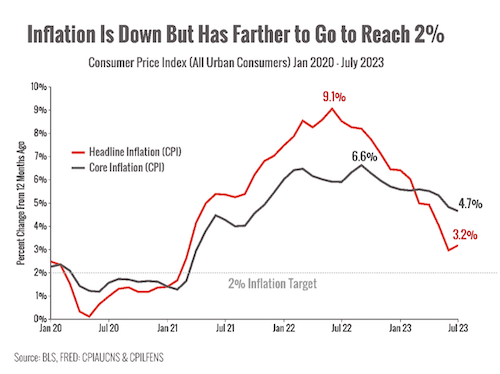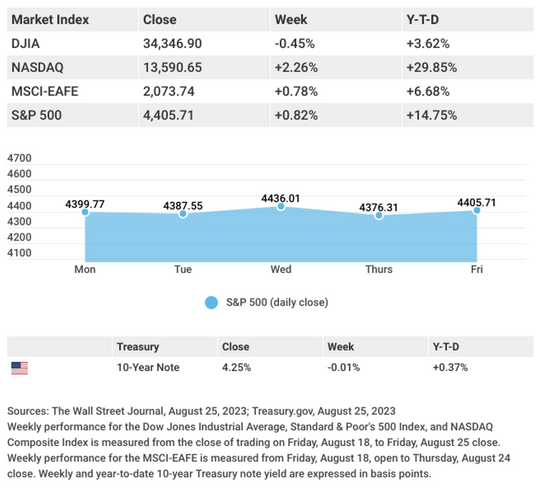How High Will Rates Go?

How high do you think the Federal Reserve will have to push interest rates to fully tame inflation?
(Our crystal ball is in the shop so we'd like to borrow yours.)
Some good news first: inflation is much, much lower than it was last summer.
From its 2022 peak, headline inflation has plummeted to 3.2% in July after rising slightly over June's reading.1
Core inflation (subtracting volatile food and fuel categories) clocked in higher at 4.7% but is still well below its 2022 high.
Here's some not-great news: Now comes the challenge of taming the last bit of inflation to reach the Fed's target of 2%.
If you're a fan of the Pareto Principle (often called the 80/20 rule), you might wonder if passing the homestretch will take outsized effort from policymakers.
With mortgage rates hitting historic highs and Americans carrying over $1 trillion in credit card balances, the Fed's next moves will have big implications for consumers and the economy.2,3
What are the Fed's options?
On the surface, the Fed has two basic options.4
Option 1: They could raise rates aggressively again to try to get to 2% inflation quickly.
That policy risks an economic downturn that the Fed is hoping to avoid to achieve their "soft landing."
Option 2: The Fed could play a waiting game and raise or lower rates opportunistically as needed.
The risk here is that they miss their opportunity, high inflation lingers, and the Fed is forced into harsher measures that trigger a bigger downturn later.
The Fed is trying to thread the needle between just enough pressure but not too much.
Some analysts think we're already in a "rolling recession" so the Fed may not be able to entirely avoid a downturn whichever path they choose.5
There may also be a third option but it could have even more drawbacks than the other two.
Option 3: Move the goalposts and consider 3% inflation the official new target.
You may have heard some investors say that since 2% inflation is an arbitrary goal anyway, 3% would allow the Fed more room to manage interest rate policy without damaging the current economy.
However, changing the target could cause more problems by undercutting the Fed's credibility and signaling that the central bank no longer has control over inflation. Since much of the Fed's ability to do its job relies on people trusting what it says and does, losing credibility isn't just an ego blow—it could be a big deal for the U.S.
And now we have an answer on this option. Last weekend at the Fed’s annual economic symposium, Chairman Powell rejected this idea unambiguously, stating that the 2% target would remain the Fed’s inflation goal. So this concept is out, leaving option 1 and 2 above.
It'll be a tricky play whatever policymakers decide.
Let's be prepared for more market wobbles in the weeks to come.
Bottom line: We’re keeping an eye on interest rate policy and we’ll send updates as warranted.
Any questions about how Fed moves could affect you? Let us know and we'll find a time to chat.
Boost Your Productivity With These Tips
Take regular breaks. It seems counterintuitive, but most people are more productive when they take frequent breaks.
Do the complicated tasks first. Mark Twain famously said to "eat the frog first thing in the morning," meaning that you should tackle your most challenging task immediately.
Make two to-do lists, one with your weekly goals and objectives and one with your daily tasks.
Divide large projects into manageable steps. Make the things on your to-do list specific so you can continue to cross things out and make progress.
Tip adapted from Formstack6
Eagle Wealth Team Party
Our team gathered last Thursday at Monkless brew pub to spend some time celebrating our successes this year.
We were extremely thankful the wildfire smoke cleared out for the day, allowing us to sit on the deck and enjoy each other’s company. The newest Eagle family member, baby Lauren Laimbeer, even made an appearance so the team could meet her!
The Week on Wall Street
Stocks fluctuated last week, jostled by fitful bond yields and headline news, before ending strongly following Fed Chair Powell’s comments on the monetary outlook.
The Dow Jones Industrial Average slipped 0.45%, while the Standard & Poor’s 500 gained 0.82%. The Nasdaq Composite index rose 2.26% for the week. The MSCI EAFE index, which tracks developed overseas stock markets, added 0.78%.7,8,9
Stocks Manage Gains
Stock rallied on Monday on upbeat sentiment over the earnings release from a mega-cap semiconductor company scheduled for mid-week, only to see that momentum fizzle the following day on weak retail earnings and a credit downgrade of a handful of banks.
Stocks resumed their rally on weak economic data, which fueled hopes for future Fed dovishness. They also rose on expectations that earnings from a leading AI chipmaker would validate the AI narrative that propelled markets in the second quarter. Despite a blowout earnings report, stocks turned lower as investor attention quickly switched to Fed Chair Powell’s presentation scheduled for Friday.
After some initial jitteriness, Investors responded well to Powell’s comments, posting gains to close the week.
Powell Stands Firm
Powell spoke on Friday at the Fed’s annual economic symposium in Jackson Hole, asserting that, despite considerable progress, inflation remained too high and additional rate hikes may be in the offing. He acknowledged that previous rate increases had not yet thoroughly worked their way through the system, so caution about further hikes was needed. Investors reacted to Powell’s comments far better than in August 2022, when a hawkish presentation sent stocks lower.
Any companies mentioned are for informational purposes only, and this should not be considered a solicitation for the purchase or sale of their securities. Any investment should be consistent with your objectives, time frame, and risk tolerance
Advisory Services offered through My Legacy Advisors, LLC dba Eagle Wealth Management, a registered investment advisor. Confidential Information: This message and any attachments contain information from Eagle Wealth Management, which may be confidential and/or privileged and is intended for use only by the addressee(s) named on this transmission. If you are not the intended recipient, or the employee or agent responsible for delivering the message to the intended recipient, you are notified that any review, copying, distribution or use of this transmission is strictly prohibited. If you have received this transmission in error, please (i) notify the sender immediately by e-mail or by telephone and (ii) destroy all copies of this message.
1. https://www.cnn.com/2023/08/10/economy/cpi-inflation-july/index.html
2. https://www.cnn.com/2023/08/17/homes/mortgage-rates-august-17/index.html
3. https://www.cnn.com/2023/08/08/economy/us-household-credit-card-debt/index.html
4. https://www.wsj.com/economy/central-banking/how-hard-should-the-fed-squeeze-to-reach-2-inflation-77dbf56f?mod=hp_lead_pos1
5. https://www.msn.com/en-us/money/marke
6. Formstack, April 24, 2023
7. The Wall Street Journal, August 25, 2023
8. The Wall Street Journal, August 25, 2023
9. The Wall Street Journal, August 25, 2023
Investing involves risks, and investment decisions should be based on your own goals, time horizon, and tolerance for risk. The return and principal value of investments will fluctuate as market conditions change. When sold, investments may be worth more or less than their original cost.
The forecasts or forward-looking statements are based on assumptions, may not materialize, and are subject to revision without notice.
The market indexes discussed are unmanaged, and generally, considered representative of their respective markets. Index performance is not indicative of the past performance of a particular investment. Indexes do not incur management fees, costs, and expenses. Individuals cannot directly invest in unmanaged indexes. Past performance does not guarantee future results.
The Dow Jones Industrial Average is an unmanaged index that is generally considered representative of large-capitalization companies on the U.S. stock market. Nasdaq Composite is an index of the common stocks and similar securities listed on the NASDAQ stock market and is considered a broad indicator of the performance of technology and growth companies. The MSCI EAFE Index was created by Morgan Stanley Capital International (MSCI) and serves as a benchmark of the performance of major international equity markets, as represented by 21 major MSCI indexes from Europe, Australia, and Southeast Asia. The S&P 500 Composite Index is an unmanaged group of securities that are considered to be representative of the stock market in general.
U.S. Treasury Notes are guaranteed by the federal government as to the timely payment of principal and interest. However, if you sell a Treasury Note prior to maturity, it may be worth more or less than the original price paid. Fixed income investments are subject to various risks including changes in interest rates, credit quality, inflation risk, market valuations, prepayments, corporate events, tax ramifications and other factors.
International investments carry additional risks, which include differences in financial reporting standards, currency exchange rates, political risks unique to a specific country, foreign taxes and regulations, and the potential for illiquid markets. These factors may result in greater share price volatility.
Please consult your financial professional for additional information.
This content is developed from sources believed to be providing accurate information. The information in this material is not intended as tax or legal advice. Please consult legal or tax professionals for specific information regarding your individual situation. This material was developed and produced by FMG Suite to provide information on a topic that may be of interest. FMG is not affiliated with the named representative, financial professional, Registered Investment Advisor, Broker-Dealer, nor state- or SEC-registered investment advisory firm. The opinions expressed and material provided are for general information, and they should not be considered a solicitation for the purchase or sale of any security. Copyright 2023 FMG Suite.








